Samarkand
Authors: David V.H. Peters & Harry Wu
Publisher: Queen Games
Year: 2010
review by

| x |
|
|
|
|
|
|
|
|
|
|
|
|
|
|
|
|
|
|
|
|
|
|
|
|
|
|
|
|
|
|
|
|
|
|
|
|
|
|
|
|
|
|
|
|
|
|
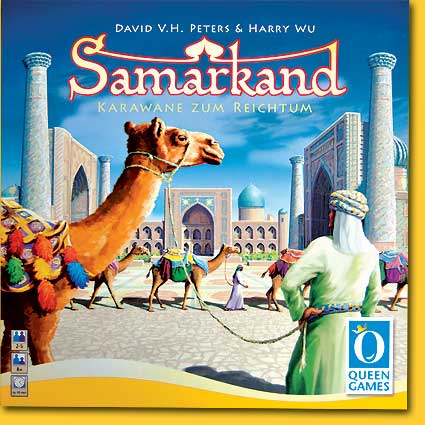 |
The Silk Road forms a trade connection between Europe and Asia. Rich merchant families travel from east to west and vice versa, loaded with valuable goods such as silk, china and spices. The players offer themselves as merchandise, but in a respectable way: we present ourselves as the perfect son- or daughter-in-law. Once joined in wedlock, we have earned the right to be involved in the family business, and we try to make it more blooming than ever. Luckily, polygamy is not an unusual phenomenon in those regions, so through strategic marriage we can obtain influence in the whole of Arabia and Persia! For those who fear huge numbers of offspring or enormous alimony bills, another option to earn money is to establish trade relationships with other merchant families that operate in the same area. The wealthiest merchant wins the game!
|
|
| x |
|
|
|
|
|
|
|
|
|
|
|
|
|
|
|
|
|
|
|
|
|
|
|
|
|
|
|
|
|
|
|
|
|
|
|
|
|
|
|
|
|
|
|
|
|
|
The game board shows Arabia and Persia, divided into small areas. A camel of their colour is placed in the home town of each of the ten merchant families. In a player's turn, he may choose between two options: marrying into a family, or expanding a trading route. To get married the player pays the required marriage portion (3 to 6 Dirham) from his own cash into the family treasury. The newlywed takes one of the two available family tiles, and places it in front of him to indicate that he is now part of this family. Subsequently, he draws three goods cards, and keeps at least one of them. There are 32 goods cards that correspond to 32 numbered locations on the board, each containing a goods marker.
 |
|
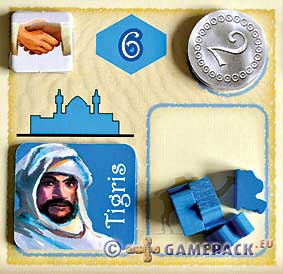 |
|
| x |
|
|
|
|
|
|
|
|
|
|
|
|
|
|
|
|
|
|
|
|
|
|
|
|
|
|
|
|
|
|
|
|
|
|
|
|
|
|
|
|
|
|
|
|
|
|
 |
|
A player can only expand trading routes of his own families. He takes a camel from the supply and places it in an area adjacent to the family's trading route. If desired, he may place a second camel at the cost of 1 Dirham, to be paid from the family treasury. If the area contains a goods marker, the player takes the marker; every marker scores one point at the end of the game. If any player possesses the matching goods card he may place it in front of him and take 3 Dirham from the supply. The card still counts against his card limit! He can also decide to keep the card in his hand; it may be worth more points at the end of the game. |
|
| c |
|
|
|
|
|
|
|
|
|
|
|
|
|
|
|
|
|
|
|
|
|
|
|
|
|
|
|
|
|
|
|
|
|
|
|
|
|
|
|
|
|
|
|
|
|
|
| When the area is occupied by a camel from another family, these families establish a trade relationship. All players that are married into the active family (the one who placed the camel) receive 3 Dirham, and all members of the passive family receive one Dirham. The active player also takes a relationship marker from both families; these markers score one point at the end of the game. When the two families meet again they do not establish a new trade relationship. Only two camels are allowed in each area. |
|
 |
|
| c |
|
|
|
|
|
|
|
|
|
|
|
|
|
|
|
|
|
|
|
|
|
|
|
|
|
|
|
|
|
|
|
|
|
|
|
|
|
|
|
|
|
|
|
|
|
|
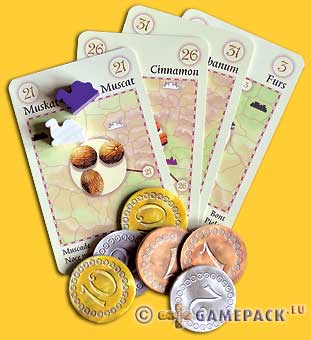 |
The game is over when all families have established at least one trade relationship, or when one family has established five trade relationships. Every Dirham, goods marker and relationship marker score one point. The goods cards yield four points per camel in the corresponding area of an own family, and one point per camel of an unrelated family.
 
|
|
| c |
|
|
|
|
|
|
|
|
|
|
|
|
|
|
|
|
|
|
|
|
|
|
|
|
|
|
|
|
|
|
|
|
|
|
|
|
|
|
|
|
|
|
|
|
|
|
 |
| c |
|
|
|
|
|
|
|
|
|
|
|
|
|
|
|
|
|
|
|
|
|
|
|
|
|
|
|
|
|
|
|
|
|
|
|
|
|
|
|
|
|
|
|
|
|
|
| c |
|
|
|
|
|
|
|
|
|
|
|
|
|
|
|
|
|
|
|
|
|
|
|
|
|
|
|
|
|
|
|
|
|
|
|
|
|
|
|
|
|
|
|
|
|
|
| c |
|
|
|
|
|
|
|
|
|
|
|
|
|
|
|
|
|
|
|
|
|
|
|
|
|
|
|
|
|
|
|
|
|
|
|
|
|
|
|
|
|
|
|
|
|
|
 |
|
|
|
|
|
|
|
|
|
|
|
|
|
|
|
|
|
|
|
|
|
|
|
|
|
|
|
|
|
|
|
|
|
|
|
|
|
|
|
|
|
|
|
Wait a minute, isn't this 'Chicago Express', the train game by the same author, but with camels instead of trains and marriages instead of shares? Indeed it is very similar, but 'Samarkand' is more than 'Chicago Expres's for 1001-nights fans. The main difference is that the families have no value, so they do not increase in value upon expansion. Money can be earned when two families establish a trade relationship, but only for players that are already members of the family when the relationship is established.
Another way to score points is with goods cards. When the location indicated on a player's goods card is occupied by a camel, the corresponding family is an attractive partner for this player, but not necessarily for other players.
|
|
| c |
|
|
|
|
|
|
|
|
|
|
|
|
|
|
|
|
|
|
|
|
|
|
|
|
|
|
|
|
|
|
|
|
|
|
|
|
|
|
|
|
|
|
|
|
|
|
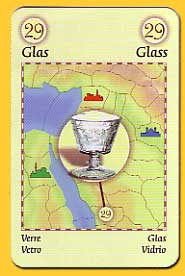 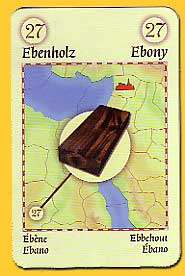 |
The value of a family is very personal; it is possible to expand a trading route toward a certain goods marker, thereby increasing the value for the player that holds the corresponding goods card, but not for the other 'shareholder'!
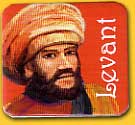 |
|
| c |
|
|
|
|
|
|
|
|
|
|
|
|
|
|
|
|
|
|
|
|
|
|
|
|
|
|
|
|
|
|
|
|
|
|
|
|
|
|
|
|
|
|
|
|
|
|
|
It can be an advantage to be the sole member of a certain family. No other players benefit from the establishment of trade relationships, and you alone can decide the trading route. On the other hand, it is also favourable to earn money when another relative establishes a trade relationship in his turn. Of course everybody likes their family to be the active family, so players tend to leave two empty spaces between their family and other families so they can not be reached in a single turn; in cooperation with another relative, it is easier to establish active trade relationships.
|
|
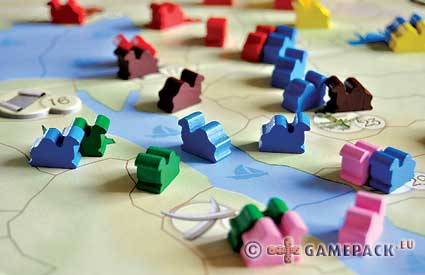
|
|
| Since there are no shares to auction like in Chicago Express you can't force others to marry into your family, to refill the family treasury and to get some help in expanding the trading route. But the family treasuries rarely run low: the first camel is always for free, so even when the family is bankrupt, the route can still be expanded, albeit at a slower pace. |
|
| x |
|
|
|
|
|
|
|
|
|
|
|
|
|
|
|
|
|
|
|
|
|
|
|
|
|
|
|
|
|
|
|
|
|
|
|
|
|
|
|
|
|
|
|
|
|
|
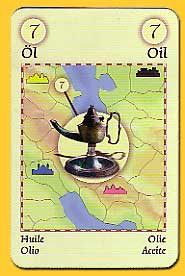 |
This makes Samarkand a family friendly version of Chicago Express: it has the same interesting balance of 'give and take', but is more straightforward and requires less gut feeling due to the absence of share auctioning. The game can be finished in 40 minutes, which is sometimes a bit too soon: too soon to develop the trading routes to full satisfaction, and too soon to justify the laborious game set-up with ten colours of camels and 32 goods markers.
© 2010 Barbara van Vugt
   
|
|
| x |
|
|
|
|
|
|
|
|
|
|
|
|
|
|
|
|
|
|
|
|
|
|
|
|
|
|
|
|
|
|
|
|
|
|
|
|
|
|
|
|
|
|
|
|
|
|
Samarkand, David V.H. Peters & Harry Wu, Queen Games, 2010 - 2 to 5 players, 8 years and up, approx. 45 minutes
|
|
  |
|
|
|
|
|
|
|
|
|
|
|
|
|
|
|
|
|
|
|
|
|
|
|
|
|
|
|
|
|
|
|
|
|
|
|
|
|
|
|
|
|
|
  |
The scarse tactics the game offers evaporate in a way too short five player game |
  |
Opaque, sometimes wheezy game, but nice to play |
  |
|
|
|
|
|
|
|
|
|
|
|
|
|
|
|
|
|
|
|
|
|
|
|
|
|
|
|
|
|
|
|
|
|
|
|
|
|
|
|
|
|
|
  |
Nice swift game, but difficult to estimate a winner |
  |
Choices in the game are limited and obvious; game lacks excitement |
| x |
|
|
|
|
|
|
|
|
|
|
|
|
|
|
|
|
|
|
|
|
|
|
|
|
|
|
|
|
|
|
|
|
|
|
|
|
|
|
|
|
|
|
|
|
|
|
| x |
|
|
|
|
|
|
|
|
|
|
|
|
|
|
|
|
|
|
|
|
|
|
|
|
|
|
|
|
|
|
|
|
|
|
|
|
|
|
|
|
|
|
|
|
|
|
 |
|
|
|
|
|
|
|
|
|
|
|
|
|
|
|
|
|
|
|
|
|
|
|
|
|
|
|
|
|
|
|
|
|
|
|
|
|
|
|
|
|
|
 |
|
|
|
|
|
|
|
|
|
|
|
|
|
|
|
|
|
|
|
|
|
|
|
|
|
|
|
|
|
|
|
|
|
|
|
|
|
|
|
|
|
|
| x |
|
|
|
|
|
|
|
|
|
|
|
|
|
|
|
|
|
|
|
|
|
|
|
|
|
|
|
|
|
|
|
|
|
|
|
|
|
|
|
|
|
|
|
|
|
|
 |
|
|
|
|
|
|
|
|
|
|
|
|
|
|
|
|
|
|
|
|
|
|
|
|
|
|
|
|
|
|
|
|
|
|
 |
|
|
|
|
|
|
|
|
|
|
|
|
|
|
|
|
|
|
|
|
|
|
|
|
|
|
|
|
|
|
|
|
|
|